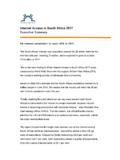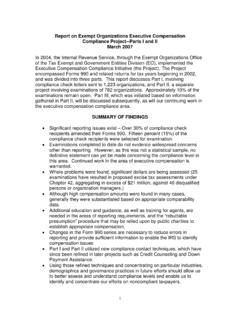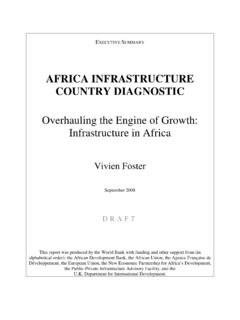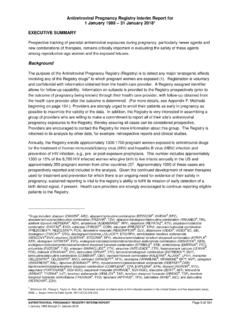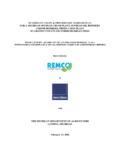Transcription of South African Social Media Landscape 2012 - …
1 South African Social Media Landscape 2012 Executive Summary Social Media breaks barriers in SA Corporate SA wakes up to Social Media Social Media breaks barriers in SA Social networking in South Africa has crossed the age barrier, the urban/rural divide and even the relationship gap, according to research findings announced today. The South African Social Media Landscape 2012 study, produced by technology market researchers World Wide Worx and information analysts Fuseware, shows that the fastest growing age group among Facebook users in South Africa is the over-60s. From August 2011 to August 2012 , the number of over-60s on Facebook grew by 44%, compared to less than 30% for those aged 30-60, less than 20% for those aged 19-30, and less than 10% for teenagers.
2 This is a reflection of Facebook going mainstream in South Africa, says World Wide Worx managing director Arthur Goldstuck. The younger segments are still far from saturation, but we re not seeing the same heady pace of growth among the youth as before. At the end of August, South Africans were using Facebook on the Web, 2,43-million were on Twitter and 9,35-million on Mxit. Because Facebook does not measure mobile-only usage among those who have registered via their cellphones, however, the full extent of its penetration is significantly understated: primary research by World Wide Worx shows that people access Facebook on their phones. Twitter use measured in this primary research indicates that its user base had grown to 2,2-million by the end of June, or 100 000 new users a month since August last year.
3 Fuseware data, collected directly from Twitter through an API (application programme interface), shows that the number reached 2,4-million at the end of August, exactly matching the growth rate measured by World Wide Worx, and validating the earlier data. The integrity of data, and its interpretation, is vital for business decision-makers and marketers who are investing in Social Media , says Fuseware managing director Mike Wronski. Different methodologies allow us to gain deeper insights, as well as providing cross-validation for our data. Other key findings announced today include: Both Facebook and Twitter have grown at a similar rate, at around 100 000 new users a month, for the past year.
4 LinkedIn has grown substantially, but at a slightly lower rate, to reach 1,93-million South Africans. Pinterest is the fledgling among the major Social networks, with only 150 000 users in South Africa. *WhatsApp has become the leading instant messaging tool among South Africans aged 16 and over, living in cities and towns, with a user base of 4,6-million. The youngest mobile instant messaging tool to emerge on the measurement radar in South Africa, 2Go, has close to a million adult users. The most common Check In sites for Facebook in South Africa are airports and shopping malls. The biggest tweeting day of the week is a Monday, with an average of 9,6-million tweets sent by South Africans on the first working day of the week.
5 Friday is next, with , while Saturday is the slowest Twitter day, with 8,4-million tweets. Both Facebook and Twitter have crossed the urban/rural divide. The proportion of urban adults using Facebook is a little less than double rural users - but rural users are now at the level where urban users were 18 months ago. Twitter's urban penetration is a little more than double its rural penetration, but the rural proportion has also caught up to where the urban proportion was 18 months ago. One of the most fascinating findings reported today is that the number of single users has grown faster than any other relationship group, by almost 25%, to reach 957 000. The number of married and engaged users has each grown by 16%, while the category of those in a relationship has increased by 9%.
6 Clearly, Facebook is filling a relationship gap in the lives of many South Africans, says Goldstuck. But Social networks are also so much more we see them playing the roles of communication, information and entertainment networks. Wronski adds: Social Media fatigue has set in for the more over-active users, who follow too much, communicate too much, and vent too much. But most users are arriving in this world for the first time, and new users are going to keep coming. It s mainstream today but, tomorrow, it will be pervasive. Corporate SA wakes up to Social Media Large corporate brands in South Africa have woken up to Social Media , following in the footsteps of their customers.
7 The South African Social Media Landscape 2012 study reveals that 95% of major brands surveyed have some form of Social Media strategy aimed at consumers. However, only 51% rate their efforts on Facebook as effective and only 33% believe they are effective on Twitter. The survey shows that corporate South Africa has woken up to Social Media , but it hasn't yet figured out how to dress for the role, says Goldstuck. Most large companies are still neutral on the impact of Social Media , and are still feeling their way. The report includes analysis of South African consumers use of Facebook, Twitter, Mxit, LinkedIn, Pinterest and Foursquare, as well as a survey conducted among corporate brand owners.
8 We interviewed representatives of 61 major brands, and found that corporate use of Social networks tended to be a case of responding to Media hype, says Wronski. The most popular Social Media platform in South Africa, Mxit, is used as a marketing tool by only one out of five large brands. This compares to Facebook, with nine out 10 using it, and Youtube, with two out of three. Other key findings include: 49% of South African corporations surveyed leave Social Media in the hands of a marketing team, while 18% allocate it to public relations and a further 18% outsource it; The most commonly cited reason for using Social Media is as an effective PR channel, with 70% of brands using it for this purpose, while 62% use it as a core part of their marketing campaigns; Sales represent a key element of Social Media for corporations, with 43% using it for customer lead generation; Only 13% of companies are using Social Media specifically because their competitors are using it.
9 Most companies intend to make investments in training their current people in Social Media best practices. A full 36% intend to use specialist Social Media agencies to assist in their Social Media PR and marketing. Only 15% say their skills are optimal. The survey shows that that corporate brands are also still getting to grips with how to measure their Social Media effectiveness. While 74% use number of followers as a key measure on Twitter, only 24% measure the number of their own customers who are followers. Similarly, while 72% measure effectiveness according to comments and mentions, only 40% consider Sentiment analysis, evaluating the positive or negative tone of the comments.
10 An even bigger gap is seen on Facebook, where 83% of brands live by comments and mentions, but only 37% use Sentiment analysis. The survey shows that companies haven t quite figured out what is more important, says Goldstuck. It comes down to separating volume from value, and that takes time and energy, rather than just a dashboard of numbers. Wronski adds: When we asked companies what barriers were preventing marketers from getting more value out of Social Media , the most commonly cited was, Time to properly manage these channels . This is the largest bottleneck to Social Media success. Brands are struggling to allocate resources and time to manage Social channels. Contents 4 Executive Summary.
